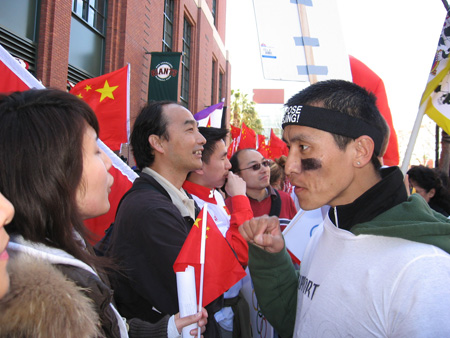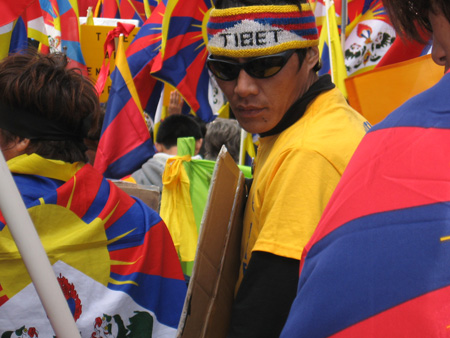The Scene: Wednesday, April 9th, Justin Herman Plaza, San Francisco... the gathering place for all torch protesters, torch supporters and torch rubber neckers.
The buzz: it was all about being a part of the pageantry that is largely what the Olympics are all about. A little bit of light from the birthplace of the games that was coming to us. One that will inevitably spark strong feelings of nationalism for some, and anger for others. San Francisco, a city that honors free speech, will be the place to safely air strong feelings about what the torch and the games mean. Or so the thinking went.
10 AM
The crowds gather in anticipation of glimpsing the torch along the originally scheduled route. The first thing that you notice is that besides the expected groups of protesters concerned with China's brutal policies and actions in Tibet, Burma, Sudan and China itself, there are huge expanses of red that upon further inspection were made up entirely of Chinese flags held aloft by thousands of pro China supporters in red sweatshirts and jackets. I was suddenly reminded of the ugly history of the Olympic torch relay. It was devised by Nazi Germany in 1936 for the purposes of propaganda and glorifying the Aryan race. That focus on pageantry goes a long way to explaining why the Chinese government itself had arranged for bus loads of China supporters to be present that day.
The ones I spoke with said they were there primarily to show support for the Olympics taking place in their homeland. This common ground gave me hope. Everyone was there to celebrate what is good about the Olympics. However, I doubt the Chinese government organizers foresaw that the bussed-in fans of the Olympics in Beijing would have very little to say in defense of the Chinese policies that the rest were there to protest. All day I recorded conversations that these China supporters had with the various protesters and many of them clearly had very little grasp of the history of the Chinese invasion of Tibet, the impact of China's policies in Sudan and other issues that formed the crux of the protests. At least on a very individual level, the Chinese failed on the propaganda front in terms of the few Chinese people I saw firsthand begin to ask questions, and then to acknowledge that the situation in Tibet is indeed problematic, or that China's implicit support for genocide in Sudan needs to be addressed. In one case, I witnessed a red clad China supporter reach across to hug a man draped in a Tibetan flag and call him brother. Brotherhood, common ground -- could it be that the Olympic ideal was being honored, almost in spite of itself?

12 PM
The crowds spread out along the Embarcadero, the last known intended location for the torch run. As thousands waited, tensions mounted. That's where those images of angry protesters yelling in each others' faces come from. These images constituted the primary meal fed to the global media beast that day. It was apparent to me that aggressive verbal instigation was coming from all sides. The heated ad hominem debates I witnessed were pretty scary as they escalated to the brink of harassment and assault. Sticking a bullhorn in someone's ear and then shouting slogans, spitting on someone or throwing water at them -- I saw this come from all sides and eerily the perpetrators were almost always grinning. The fact that the media was everywhere standing by ready to document an outbreak or some other visualization of the clash of opinions certainly added to the heated atmosphere. I saw a laughing Chinese man throw pennies at Tibet supporters, and another shout through a bullhorn that all Tibetans are "losers." This powerful political statement had the unintended consequence of making him out to be a pretty weak pro-China advocate. In fact, most China supporters stuck to chanting "One China" which, actually proved to be another excellent starting point for shared dialogue. Tibet supporters replied that they want one China too, they just don't want to be a part of it. Of all the images I will remember from that day it's not the screaming crowds but the activists who were brave enough to repeatedly link arms and create a human barrier, effectively restraining their clearly provoked anti-China colleagues. "No violence, remember?" and "Peace, we're all brothers" were mixed in with the chants of "Free Tibet" and "One China". Any act of violence, regardless of who was responsible for sparking it would have played into China's excuse to suppress all demonstrations and to validate their pressuring the city to take such drastic measures to ensure that the all important face of the event remained intact.

1 PM -- Whither the torch?
The torch relay itself of course turned into a sort of hide and seek that on a macro level is highly symbolic of China's increasingly desperate attempts to cover up the gaping chasm between what is shown to the world and how things really are in China. The spotlight of the Olympics is not only highlighting the glories of a modern China but also showing the ugly underside, repressive policies and a population far from united in supporting the government. Despite another three hours of following rumored leads, chasing a decoy bus, and in my case covering a good 10 miles on foot back and forth along the Embarcadero, very few of us actually saw the torch until we went home to watch it on TV.
4 PM
Everyones claims victory that afternoon. The Tibetans and other anti-China groups had achieved the goal of disrupting the torch route and of aborting the closing ceremony and they managed to do all this in a non-violent manner, as the Dalai Lama had specifically requested in an message he issued earlier in the week. Word came that one of the runners had pulled out a Tibetan flag during his leg, and another was able to flash a Free Tibet sign.
The city was happy to have had no major incidents. Technically it had pulled off a relay of sorts, even if it meant hiding the torch in a warehouse, bussing it from location to location, using a decoy torch and ultimately disappointing thousands who had turned out for a glimpse of the real thing.
China was happy too. The waves of red flags played well on TV and ultimately the torch relay, despite being abbreviated, was completed.
But in a day full of unintended consequences here's the one that I hold to be the true victory. It's the camaraderie I witnessed when individuals -- whether they were carrying Chinese flags, Tibetan flags, Save Darfur or Free Burma signs -- were all united in their goal to try and find the torch. On the ground level we were all forced to communicate and create a bond, with a common mission, however ironic that may be. And rather than the Olympic torch, that hug that I witnessed between two men who were able to acknowledge their common humanity all the while debating the politics of the Olympics is to me the true symbol of what was achieved that day.
Δεν υπάρχουν σχόλια:
Δημοσίευση σχολίου